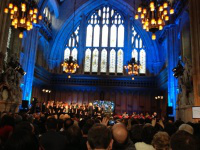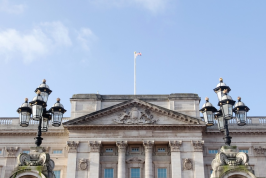Archbishop Desmond Tutu receives 2013 Templeton Prize

Last night's Templeton Prize award ceremony at the Guildhall
Archbishop Desmond Tutu received the 2013 Templeton Prize last night, at a glittering ceremony in London's medieval Guildhall. The former Anglican archbishop of Cape Town was presented with the award for his 'life-long work in advancing spiritual principles such as love and forgiveness which has helped to liberate people around the world'.
The prize, founded by the global investor and philanthropist Dr John Templeton in 1973, is valued at £1.1 million (about $1.7 million or €1.3 million) - the world's largest annual monetary award.
Heather Templeton Dill, daughter of Dr Templeton, presented Archbishop Tutu with the Tree of Life medallion, reflecting the breadth and depth of the Templeton Prize. 'The Tree of Life is regarded as all-nourishing and all-giving, and reflects a link between heaven and earth.'
Dr John M Templeton, Jr president and chairman of the Foundation, said in a video statement: "By embracing such universal concepts of the image of God within each person, Desmond Tutu also demonstrates how the innate humanity within each of us is intrinsically tied to the humanity between all peoples." He noted: "Desmond Tutu calls upon all of us to recognize that each and every human being is unique in all of history and, in doing so, to embrace our own vast potential to be agents for spiritual progress and positive change. Not only does he teach this idea, he lives it."
A message of congratulations was read from Prime Minister David Cameron who was unable to attend.
In his remarks, Archbishop Tutu praised last year's winner, the Dalai Lama, saying: "He is one of the holiest people I have met." After living in exile for more than 50 years, he said the Dalai Lama showed "not a stitch" of resentment and said in fact he had a very "impish" sense of humour.
The Archbishop said he felt deeply indebted to his mother whose appearance "a long nose" and "dumpy" figure he had inherited. He said he hoped he had also inherited some of her caring and generous personality. Tutu said he also owed much to Archbishop Trevor Huddleston, but he was also deeply indebted to all those who had helped in the struggle against Apartheid. His Christian faith and his African heritage made him realise 'ubuntu' - that all people are created by God to live together.
Archbishop Tutu's daughter, The Rev Mpho Tutu then paid tribute to her father. She said partnership was an essential part of their upbringing, and prayer was a vital part of his daily life. "For my father life without prayer would be a guitar without strings" she said.
The evening began with a procession by the London African Gospel Choir and a prayer led by Rev Mpho Tutu. Annie Lennox OBE performed two songs: 'Don't Let It Bring You Down' and 'Many Rivers To Cross' and the Eric Whitacre Singers sang Singet dem Herrn and Lux Aurumque before a closing prayer led by the Very Rev Stephen Jacobson.
Further information and videos will be available at www.templetonprize.org
Archbishop Desmond Tutu
Born in 1931 in the small Transvaal city of Klerksdorp, South Africa, Tutu first experienced an alternative to institutionalized racism as a small boy when he saw a white priest tip his hat to Tutu's mother, showing him that religion might effect positive change. Later, as a teenager in the Johannesburg suburb of Sophiatown, a center of black culture, he slowly recovered from a near fatal case of tuberculosis, inspiring him to become a doctor. Despite acceptance into medical school, a lack of tuition thwarted his dream, so he opted to study education at Pretoria Bantu Normal College.
At 23 he began teaching at his alma mater, Johannesburg Bantu High School, only to quit three years later to protest deteriorating standards of black education mandated by the Bantu Education Act which severely reduced schooling to only three hours daily, segregated institutions of higher learning, and eliminated government funding to the remaining non-white colleges, largely condemning those students to careers in service industries and manual labour.
In 1960 he earned a Licentiate of Theology from St Peter's Theological College in Rosettenville and, the next year, was ordained to the Anglican priesthood in nearby Johannesburg. After receiving a Master of Theology degree from King's College, London in 1966, he returned to South Africa to teach at the Federal Theological Seminary and serve as chaplain at the University of Fort Hare in Alice in the Eastern Cape. While there he witnessed police brutality for the first time, in response to a peaceful student protest.
In 1972, Tutu became Associate Director for Africa of the Theological Education Fund of the World Council of Churches, a three-year position that took him on 48 visits to 25 countries in sub-Saharan Africa and immersed him in the emerging philosophies of black consciousness and theology.
His 1975 appointment as the first black Anglican Dean of Johannesburg provided him an international platform in the anti-apartheid movement. Within six months he was named Bishop of Lesotho. While there he wrote a prescient plea to the South African prime minister to avoid bloodshed and violence by drastically reforming government racial policies. Only months later, his call unheeded, several hundred young people were killed by police in the June 16, 1976 'uprising' named for the Johannesburg suburb of Soweto.
In the mid–1980s he pressed US President Ronald Reagan and British Prime Minister Margaret Thatcher - unsuccessfully - to support economic and military sanctions against South Africa. Following election as Bishop of Johannesburg in 1985, he became Archbishop of Cape Town in 1986, the first black cleric to lead the Anglican Church in South Africa. Convinced he was following the will of God, if not an official church mandate, he led 30,000 in a Cape Town protest on September 13, 1989, precipitating massive multi-racial peace marches nationwide, often led by Anglican bishops. South African Prime Minister FW De Klerk soon moved to defuse the crisis, meeting with Mandela, broadly desegregating public facilities, lifting the ban on the African National Congress, and freeing many imprisoned activists including, in February 1990, Nelson Mandela.
In the first years following those moves some 14,000 more South Africans died in political violence. Chris Hani, the popular general secretary of the South African Communist Party, was assassinated in 1993, threatening the country again with anarchy. When Tutu preached at Hani's funeral, he invoked Paul's letter to the Romans, "If God be for us, who can be against us," assuring the 120,000 gathered outside Soweto in the country's largest stadium that they, the "rainbow people of God" were "moving to freedom and nobody can stop us… for God is on our side." The next year, the nation's first multi-ethnic democratic elections made Nelson Mandela president. In 1995, the year before retiring as archbishop, Tutu was named chair of the Truth and Reconciliation Commission, which conducted four years of hearings on crimes of the apartheid era culminated by a 3500-page final report delivered to Mandela in 1998.
In 2007, with Nelson Mandela and wife Graça Machel, he helped form The Elders, an independent group of former global leaders including former US President Jimmy Carter and former UN Secretary-General Kofi Annan, who work for peace and human rights in trouble spots around the world. He received the Presidential Medal of Freedom, America's highest civilian honor, from President Barack Obama in 2009. Though officially retired from public life since 2010, Tutu continues work with the Desmond & Leah Tutu Legacy Foundation and The Elders, among other groups, in a redoubling of efforts to defend human rights around the world.
His extensive writings include No Future without Forgiveness, and most recently, God Is Not a Christian: And Other Provocations.















